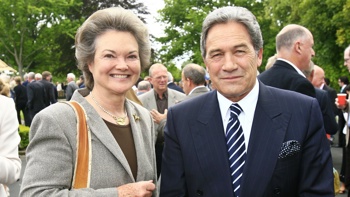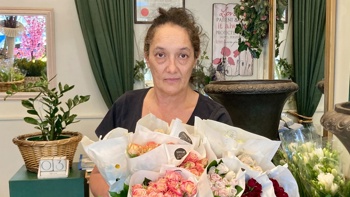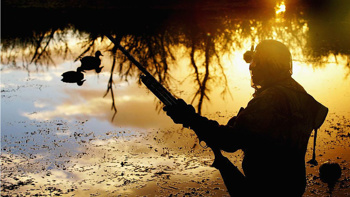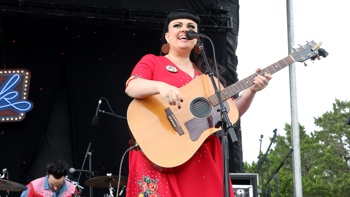It was a beautiful morning in a picture postcard spot, and then the house collapsed.
Moments earlier on February 1, in the aftermath of the Auckland floods, Cheryl Gilroy was in the lounge reading This Is Going to Hurt: Secret Diaries of a Junior Doctor. Her mother was enjoying the sea view and the sun had just come out.
Darren Gilroy, Cheryl’s husband was snoozing downstairs. He slept through the first rumble but woke up when the retaining wall smashed into the walls and windows of the upstairs bedrooms.
He went to check on his wife and mother-in-law, saw the retaining wall and knew they had to evacuate immediately.
Two minutes later there was a thunderous rumble.
Cheryl said the roaring noise sounded like a freight train.
Speaking for the first time since their remarkable survival, Cheryl said: “Both mum and I jumped up. We looked at each and I thought ‘What the f***?’ Darren who was below us yelled, ‘Get out, get out, Get out!’.
“I told mum, ‘run as fast as you can.’ We went on to the veranda at the top of the stairs then the house hit us and pushed us forward.
/cloudfront-ap-southeast-2.images.arcpublishing.com/nzme/SOUM6MVZP5GRPDPI3PULCVB67Q.jpg)
Darren and Cheryl Gilroy survived a house collapse at Orua Bay on February 1, 2023. Photo / Supplied
“The house, the trees, and everything in the house hurled us on to the beach. I was knocked all over my body. As I tumbled, I thought, ‘this is it I am going to die’ but when I landed on the sand I thought ‘oh my god, I am alive’.”
Darren was also taken out by the house and landed on his head and shoulders. His leg was fractured, he suffered lacerations and he lost lots of blood.
“I looked at my leg and I could see bone sticking out of it. I thought s*** that’s not good.”
The couple, and Cheryl’s mother, who doesn’t want to be named, are thankful to be alive but they want to know why the Airbnb house toppled.
They also want to urge travellers to take out extra insurance for personal injury and natural disasters.
Clean-up begins at a slip at Orua Bay on the Awhitu Peninsula, south of Auckland on February 1 crushing a house and injuring the three occupants inside. Photo / Andrew Bayly
“We don’t blame the owner but was there a problem with the retaining wall at the back of the house? Who is responsible for this? Was it the land? A natural disaster? The council’s fault? Ours was a one-off but these events will be more common now because of climate change,” Darren said.
Cheryl 61, and Darren, 60, had flown in from New South Wales to spend time with Cheryl’s 83-year-old mother who lost her husband to cancer. On their way to New Zealand Cheryl sent a text to their children “I love you, no matter what happens”.
About 11.30am on February 1 the two-storey Bach was knocked off its foundations, sending it 15m down a cliff.
Days earlier, torrential rain had wreaked havoc across the Auckland region causing severe flooding and damage. The owner of the property texted the Gilroys to warn them heavy rain was on its way and suggested they could reschedule but the couple decided to go ahead with the holiday plans.
/cloudfront-ap-southeast-2.images.arcpublishing.com/nzme/N3EP6C62IFFVPCHHG72HIPFVLM.jpeg)
The Orua Bay house was reduced to rubble after a landslide tore through it. Photo / Auckland Westpac Rescue Helicopters
Darren says he could’ve died three times that day - in the landslide, if his neighbour Andy hadn’t used two shoe laces to tie a tourniquet on his leg and if he didn’t have a blood transfusion on the beach. “I lost a lot of blood and was as white as a ghost I’m sure they thought I would die. I nearly lost my life, my leg and now my livelihood,” Darren said.
After Cheryl clambered out of the debris, she found Darren but not her mother.
“I yelled like a lunatic, ‘my mother is stuck inside.’ Mum heard me and said, ‘Cheryl I am here, it’s okay. I am here. I cried. Mum only lost dad recently so I thought will she give up? But she’s a tough cookie,” Cheryl said.
Cheryl was battered and bruised and needed stitches for the cuts on her upper arms. She has become anxious and is easily triggered by loud noises.
/cloudfront-ap-southeast-2.images.arcpublishing.com/nzme/A3ABQRRX7FESLJOV5B6LKIJUTU.jpg)
Cheryl and Darren Gilroy with the neighbours who helped them after the Airbnb house in Orua Bay collapsed. photo / supplied
Dr Gary Payinda, from Auckland Helicopter Rescue, explained getting to the beachfront houses, which are only accessible at low tide, was difficult, so he and paramedic Ross Aitken, were lowered about 25m from the helicopter to the bach.
The Whangarei doctor - who was on his last days as part of the rescue team - was impressed with the “chain of survival,” including the locals and St John paramedics who attended to the patients, and Fire and Emergency NZ assessing the safety.
Urban Search and Rescue used steel poles to brace the roof so they could get access to Cheryl’s mother who was trapped under rubble for two hours below the tideline.
“The level of destruction blew me away. The two houses on either side are pristine and this one looked like it was basically dropped from a great height,” Payinda said.
Doctor Gary Payinder saved the Gilroy family whose house collapsed at Orua Bay on February 1. Photo / Supplied
Both Payinda and paramedic Ross Aitken were worried how they would navigate their way into the rubble. Cheryl’s mother was on her back in a small rivulet of running water shrouded in plywood, tin roofing, beams and a ranch slider with shattered glass.
The two clinicians were fighting against the time and the tide.
“There was a large frame around her, it looked like she was in a casket but that protected her from being crushed by the debris. She was pinned at the shins, there was nothing visible from her waist down. She is 100 per cent lucky to be alive, shockingly bad luck to have a house fall on top of you but shockingly good luck to survive it.”
Cheryl’s mother fractured her ribs, vertebrae and broke her collar bone. She had internal bleeding and an aneurysm. Aitken described her as extraordinarily calm, stoic, and brave.
“I’d like to meet her; it was very rewarding to we were able to help her. Although she was significantly injured, she has made a recovery – that doesn’t always happen so it’s nice to have a good outcome,” Aitken said.
/cloudfront-ap-southeast-2.images.arcpublishing.com/nzme/WSRYD7GUOVBWRJKDAVGJERCI7M.jpg)
Ross Aitken, a paramedic for Westpac Rescue Helicopter. Photo / Supplied
Darren spent 27 days in Auckland City Hospital while his mother-in-law was at Middlemore being treated for a brain aneurysm and skin grafts. The day of the landslip Cheryl had only the clothes on her back and a mobile phone. She had no shoes; no glasses and all of their money and passports were left behind. Luckily, she was able to access funds from an old credit card on her phone.
After Cheryl was discharged from hospital she booked into a hotel which was covered by insurance.
“I had no shoes, no glasses I couldn’t see. I think I was wearing some cadaver’s clothing.”
In a statement, Auckland Council’s deputy group recovery manager, Mace Ward said: “Council does not generally investigate the cause of slips on private properties. Owners need to engage their own geotechnical engineer, for advice. The house has been issued with a red placard which prevents entry.”
The owner of the property declined to comment - but the couple also feel Airbnb should do more to ensure the safety of properties it lists.
“It’s not up to the traveller - they don’t know what the circumstances are. You pay the fee on the understanding the place is safe and secure. It’s not the duty of care for us, it’s also the duty of care for everybody that goes there,” Darren said.
In a statement, Airbnb’s country manager for Australia and New Zealand, Susan Wheeldon said: “We are shocked and saddened by this tragedy and our hearts go to those affected. Our thoughts and appreciation are also with the emergency service personnel who provided assistance in response to this natural disaster.
“The safety of our community is one of our top priorities and at the centre of everything we do and we are devastated to hear of incidents such as these on the very rare occasions on which they occur.” Airbnb didn’t respond to questions about insurance, medical costs or loss of income.
/cloudfront-ap-southeast-2.images.arcpublishing.com/nzme/55GYPTH4BNFPBJPL6XDDG4NRHU.jpg)
Cheryl and Darren Gilroy, survivors of the Orua Bay house collapse on February 1. Photo / Supplied
The couple are now back in New South Wales trying to rebuild their lives and salvage their café business. They are thinking of putting it on the market because they are struggling financially.
There is still a possibility Darren could still lose his leg and he will be on antibiotics until Christmas. The grandfather is frustrated he can’t work or go fishing but he remains philosophical.
“If they took my leg off now, I’d have a stump but I’d be up and running around. I’d be playing golf. Life goes on, there’s always someone worse off.”
Take your Radio, Podcasts and Music with you

/cloudfront-ap-southeast-2.images.arcpublishing.com/nzme/3XR4ZYB62ZDXFOLQYGZN3HOOPE.JPG)
/cloudfront-ap-southeast-2.images.arcpublishing.com/nzme/44HFBDWRYRDJ7F2AEMXGVJIFXU.JPG)








